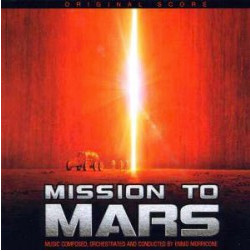主页--->m-comment-000--->mb-comment-012-109
|
电脑版 |
|||||||||||||||||
布罗克斯顿评说莫里康内 MB-012-109 |
||||||||||||||||||
MISSION TO MARS – Ennio Morricone |
||||||||||||||||||
FA0002 MISSION TO MARS (火星任务) |
||||||||||||||||||
作者 乔纳森·布罗克斯顿 (Jonathan Broxton) |
||||||||||||||||||
ENNIO MORRICONE 评论,第12部分 012-109 |
||||||||||||||||||
 |
||||||||||||||||||
火星任务——埃尼奥·莫里康内2000年3月10日
乔纳森·布罗克斯顿(Jonathan Broxton)的原始评论 《火星任务》是今年最受批评和鄙视的电影之一——一部没有情节、毫无意义的潜在太空史诗,根据大多数评论家的说法,它对星际旅行的第一步抱有好主意,并用糟糕的表演、糟糕的剧本和前神童布莱恩·德·帕尔马的绝望导演毁了它。事实上,这部电影唯一受到普遍好评的元素是特效和埃尼奥·莫里康内(Ennio Morricone)的挽歌配乐。虽然我发现自己不同意这部电影的负面新闻,但我完全同意对 Ennio 努力的评价。作为电影音乐,《火星任务》在各个方面都是一部轰动一时的电影。 这部电影的情节很简单:四名宇航员被派去执行任务,成为第一批在红色星球表面行走的人。在唐·钱德尔的带领下,勇敢的探险家们踏上了最深的太空,令人惊讶的是,他们顺利地到达了火星。在探索大本营附近的山脉时,船员们突然遭到从最高峰顶部出现的巨大龙卷风的袭击,与地球的通讯被切断。救援任务被迅速安排,四名机组人员(船长蒂姆·罗宾斯、他的妻子康妮·尼尔森、副驾驶加里·辛尼斯和工程师杰里·奥康奈尔)被派去查明发生了什么并营救任何幸存者。所发生的不是许多人所期望的英勇的太空冒险,而是对生命、太空和人类起源的抒情、美丽、深思熟虑的反思。 虽然在视觉和概念上无疑是对斯坦利·库布里克的《2001》的致敬,但《火星任务》更进一步,回答了库布里克在 1968 年提出的所有问题——这是这部电影唯一令人失望的地方。这部电影的结局完全破坏了前一个半小时发生的事情,使曾经发人深省的“假设”场景变成了对火星秘密的过于直白的解释,没有留下任何想象空间。像《2001》和最近的《接触》这样的电影的精彩之处在于,这部电影让观众对他们刚刚看到的真实性做出自己的决定。《火星任务》迫使观众接受他们所呈现的一切作为事实,从而打破了电影来之不易的现实主义。一定程度的模棱两可将有助于保留火星的神秘感和浪漫主义,并使这部电影成为一种更令人满意的体验。 但作为一部电影奇观,好莱坞需要付出一些努力,才能超越火星的广阔远景、令人难以置信的太空之美,以及德帕尔马的相机描绘的轨道上生命的近乎芭蕾舞的方式。在听觉上,《火星任务》也是一次彻底的胜利,埃尼奥·莫里康内的配乐一路领先。在大多数情况下,莫里康内避开了当今许多科幻电影中传统的“太空”声音,而是发自内心地作曲。发现的浪漫,太空的美丽,主角之间存在的情感联系,为他人的利益而做出的英勇牺牲,踏上新星球时所经历的敬畏和惊奇。这些都是莫里康内的音乐所说明的,而且非常漂亮。 专辑中的前五个提示是内省的,安静祥和的音调,缺乏管弦乐的盛况和浮夸,人们通常会联想到银河系的遥远旅程。开场曲“A Heart Beats In Space”以一系列上升的弦乐音阶开始,伴随着柔和的电吉他氛围、起伏的长笛线、小号独奏者和充满舒缓女声的合唱团,然后慢慢进入乐谱主旋律的第一次演奏。《火星救援》和《寻找的世界》都重复了主要的主题内容,前者主要是在合成器上,辅以人声,它们间歇性地膨胀到情感高涨的管弦乐渐强,有时与约翰·威廉姆斯(John Williams)温暖的太空史诗不太相似。“And Afterward”短暂地涉足了一些棱角分明、抽象的电子音调,短暂地复活了《亲密接触》中“The Conversation”的记忆,然后又回到了抒情模式,演绎了美丽而悲惨的《A Wife Lost》,其泰坦尼克号风格的合成声音。 随着有争议的教堂管风琴提示“Towards The Unknown”的出现,情绪发生了永久性的变化,这首歌在CD上不如在电影中成功,但仍然设法在听众中引起了极大的不安。鲜明的管风琴音调,成群结队地重复,随着曲目的进行,随着沉重的低音无人机和刺耳、孤立的弦乐和弦的逐渐加入,焦虑的电子脉冲的紧迫感和音量增加。这件作品强调了一个绝望的场景,救援人员徒劳地寻找船体上的小洞,这些洞在一场小型陨石风暴中受损,并且正在从大气中吸取宝贵的氧气。虽然这无疑是一种非常规的管弦乐选择,但管风琴听起来并不像人们想象的那么格格不入,它至少表明莫里康内愿意尝试新的和独特的电影配乐方式,无论在什么情况下。 然而,最后四个线索无疑是这张专辑的佼佼者,从 13 分钟的“英雄牺牲”开始,伴随着命运的太空行走,四名救援人员被迫放弃他们在火星表面高空的飞船。一开始是一种紧张的练习,逐渐发展成对人类精神的可怕感人的哀叹。主旋律的新编曲,实际上与他为1900年金球奖获奖影片《传奇》所写的曲子并无太大区别,伴随着大胆而明亮的圆号反旋律和令人心碎的木管乐器和弦乐乐章,而军鼓则将时间保留在下面,不断将军国主义与战斗中光荣死亡的浪漫形象相提并论。当合唱团的全部力量在激动人心的爱国主义“在哪里?”中加入战斗时,你知道你正在听到一个完全而彻底的天才的作品。乐谱以“All The Friends”结束,这是一首带有 Mission 式双簧管陈述的田园尾声。 我不能高度推荐这个谱曲。莫里康内抒情作品的粉丝们会发现自己对这位意大利大师主题的光辉本质感到欣喜若狂,而他创新和具有挑战性的配乐技术的崇拜者会点头欣赏他大胆的配器选择。尽管配乐很可能用与电影相同的刷子涂上柏油,但简单地将音乐与所有其他为愚蠢的科幻电影编写的古板科幻配乐混为一谈是不明智的。如果再小心一点,结局更好,《火星任务》本可以成为这一代人的太空漫游,尽管电影本身存在缺点,但莫里康内的音乐确实值得更高层次的认可。 评分:***** 曲目列表:
片长:62分20秒 好莱坞唱片 0108882HWR (2000) 音乐由埃尼奥·莫里康内(Ennio Morricone)作曲和指挥。埃尼奥·莫里康内(Ennio Morricone)的改编。由Dan Wallin录制和混音。由苏珊娜·佩里克(Suzana Peric)编辑。专辑由埃尼奥·莫里康内(Ennio Morricone |
||||||||||||||||||
2000.3.10 |
||||||||||||||||||
|
| ||||||||||||||||||
以下是原文
| ||||||||||||||||||
ENNIO MORRICONE REVIEWS, Part 12-109 |
||||||||||||||||||
MISSION TO MARS – Ennio MorriconeMarch 10, 2000
Original Review by Jonathan Broxton Mission To Mars has been one of the most critically despised movies of the year – a plotless, senseless would-be space epic that, according to the majority of the reviewers, took a great idea about the first, faltering steps of interplanetary travel and ruined it with bad acting, a terrible screenplay, and hopeless direction by the former wunderkind Brian De Palma. In fact, the only elements of the film to receive generally positive notice have been the special effects and Ennio Morricone’s elegiac score. And while I find myself disagreeing with the movie’s bad press, I couldn’t agree more with the appraisal of Ennio’s efforts. As film music, Mission To Mars is a blockbuster in every respect. The film’s plot is a simple one: four astronauts are sent on a mission to become the first people to walk on the surface of the red planet. Led by Don Cheadle, the intrepid explorers set out into deepest space and, surprisingly, they reach Mars without a single glitch. While exploring a mountain range near the base camp, the crew are suddenly attacked by a huge tornado which appears out of the top of the highest peak, and communications with Earth are severed. A rescue mission is quickly arranged, and the four man crew (captain Tim Robbins, his wife Connie Nielsen, co-pilot Gary Sinise and engineer Jerry O’Connell) are dispatched to find out what happened and rescue any survivors. What transpires is not the heroic, gung-ho space adventure that many expected, but a lyrical, beautiful, thoughtful rumination on life, space, and the origins of humanity. While undoubtedly an homage to Stanley Kubrick’s 2001, both visually and conceptually, Mission To Mars takes things one step further by providing answers to all the questions Kubrick asked back in 1968 – and this is the film’s only let-down. The film’s finale completely undermines what has transpired in the previous hour and a half, making what was once a thought-provoking “what if” scenario into a far too literal explanation of Mars’s secrets which leaves nothing to the imagination. The brilliance of films like 2001, and the recent Contact, is that the film leaves the viewer to make up their own mind as to the reality of what they have just seen. Mission To Mars compels the audience to accept everything they are presented with as truth, thereby shattering the film’s hard-earned realism. A degree of ambiguity would have helped retain the delicious mystery and romanticism of Mars, and would have made the film a far more satisfying experience. But as a cinematic spectacle, Hollywood will need to go some to top the expansive vistas of Mars, the incredible beauty of space, and the almost balletic way life in orbit is depicted by De Palma’s camera. Aurally too, Mission to Mars is a complete triumph, with Ennio Morricone’s score leading the way. For the most part, Morricone eschews the traditional “spacey” sounds that clutter many of today’s science fiction films, instead composing from the heart. The romance of discovery, the beauty of space, the emotional connections that exist between the protagonists, the heroic sacrifices that are made for the good of others, the awe and wonder experienced when setting foot on a new planet. These are the things that Morricone’s music illustrates, and illustrates beautifully. The first five cues on the album are introspective, quiet and peaceful in tone, lacking the orchestral pomp and bombast that one might usually associate with a journey into the far reaches of the galaxy. The opening track, ‘A Heart Beats In Space’, begins as nothing more than a series of ascending string scales accompanied by gentle electric guitar ambiences, an undulating flute line, a trumpet soloist, and a choir full of soothing female voices, before slowly moving into the first performance of the score’s main theme. ‘A Martian’ and ‘A World Which Searches’ all reprise the main thematic content, the former predominantly on a synthesiser, complemented by voices, and which swell intermittently to emotionally-heightened orchestral crescendos in a manner which is sometimes not too dissimilar to the warm-sounding space epics penned by John Williams. ‘And Afterwards’ briefly dabbles in some angular, abstract shifting electronic tones that briefly resurrect memories of ‘The Conversation’ from Close Encounters, before returning into lyrical mode for the beautifully tragic ‘A Wife Lost’, with its Titanic-style synthesised voices. The mood changes for good with the controversial church organ cue, ‘Towards The Unknown’, which is less successful on CD than it is in the film, but still manages to generate a great deal of unease in the listener. Stark organ tones, repeated in clusters, and an anxious electronic pulse increase in urgency and volume as the track progresses through the gradual inclusion of heavy bass drones and harsh, isolated string chords. The piece underscores a desperate scene in which the rescue crew vainly search for the tiny holes in the hull of their ship, damaged in a mini-meteorite storm, and which is draining the precious oxygen from the atmosphere. Although certainly an unconventional choice of orchestration, the organ does not sound as out of place as one might expect, and it at least shows that Morricone is willing to try new and unique ways of film scoring, no matter what the circumstances. However, it is the final four cues which are the undoubted standouts of the album, beginning with the 13-minute ‘Sacrifice of Hero’, which accompanies the fateful spacewalk as the four rescuers are forced to abandon their craft high above Mars’s surface. What begins as an exercise in tension gradually develops into a terribly moving lament for the human spirit. A new arrangement of the main theme, which is actually not too dissimilar from the one he wrote for the Golden Globe-winning Legend of 1900, emerges, accompanied by a bold and bright horn countermelody and a heartbreaking movement for woodwinds and strings, while a bed of snare drums keep time underneath, continually drawing militaristic parallels with the romantic image of glorious death in battle. When the full might of the choir joins the fray during the rousing, patriotic ‘Where?’, you know you are hearing the work of a complete and utter genius. The score concludes with ‘All The Friends’, a pastoral coda with a Mission-esque oboe statement. I cannot recommend this score highly enough. Fans of Morricone’s lyrical work will find themselves in raptures at the glorious nature of the Italian maestro’s themes, while admirers of his innovative and challenging scoring techniques will nod in appreciation of his bold choices of orchestration. Although the score is likely to be tarred with the same brush as the film, it would be unwise to simply lump the music in with all the other stodgy sci-fi scores that are written for stodgy sci-fi pictures. With a little more care, and with a better ending, Mission To Mars could have been a space odyssey for the generation, and despite the shortcomings of the film itself, Morricone’s music genuinely deserves a higer level of recognition. Rating: ***** Track Listing:
Running Time: 62 minutes 20 seconds Hollywood Records 0108882HWR (2000) Music composed and conducted by Ennio Morricone. Orchestrations by Ennio Morricone. Recorded and mixed by Dan Wallin. Edited by Suzana Peric. Album produced by Ennio Morricone. |
||||||||||||||||||
March. 10, 2000 |
||||||||||||||||||
本站电影欣赏 |
||||||||||||||||||
在线音乐试听 |
||||||||||||||||||
 |
||||||||||||||||||
Jon 是一位电影音乐评论家和记者,自 1997 年以来一直担任全球最受欢迎的英语电影音乐网站之一 Movie Music UK 的编辑和首席评论员,并且是国际电影音乐评论家协会 (IFMCA) 的主席。在过去的 20多 年中,Jon 撰写了 3,000 多篇评论和文章,并进行了多次作曲家采访。在杂志刊物方面,乔恩曾为《电影配乐月刊》、《原声带杂志》和《电影音乐》等出版物撰写评论和文章,并为普罗米修斯唱片公司的两张经典 Basil Poledouris 配乐专辑《Amanda》和《Flyers / Fire on the Mountain》撰写了衬垫注释。他还为汤姆·胡佛 (Tom Hoover) 于 2011 年出版的《Soundtrack Nation: Interviews with Today's Top Professionals in Film, Videogame, and Television Scorering》一书撰写了一章。在1990年代后期,乔恩是伦敦皇家爱乐乐团的电影音乐顾问,并与他们合作拍摄了约翰·德布尼(John Debney)的音乐电影《相对价值》(Relative Values)和奥利弗·海斯(Oliver Heise)的音乐《佛陀的指环》(The Ring of the Buddha),以及与兰迪·纽曼(Randy Newman)合作的一系列音乐会。2012年,乔恩在波兰克拉科夫举行的第五届年度电影音乐节上担任“电影节学院”主席。他是作曲家和作词家协会的成员,该协会是作曲家、作词家和词曲作者从事电影、电视和多媒体工作的首要非营利组织。 |
||||||||||||||||||
2023.12.20 |
||||||||||||||||||
2023 手机版 |
||||||||||||||||||
|
||||||||||||||||||













